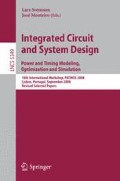Abstract
The exploitation of reconfigurable architectures is currently increasing for high-performance applications e.g. signal processing systems. Until now however, general purpose processors are typically applied for lowpower applications partly due to the un-optimized design process of FPGA systems. Currently, the increasing requirements even on low-power applications force the investigation of alternative architectures such as FPGAs to enable higher flexibility for such applications. This paper presents a multi-level overview of power optimization for FPGA-based systems. Several novel design considerations for power reduction are described and discussed as well as the achieved results. The main objective of the presented work is to enable the flexibility of reconfigurable architectures even for low-power applications.
Access this chapter
Tax calculation will be finalised at checkout
Purchases are for personal use only
Preview
Unable to display preview. Download preview PDF.
References
Paulsson, K., Hübner, M., Becker, J.: On-Line Optimization of FPGA Power- Dissipation by Exploiting Run-time Adaption of Communication Primitives. In: SBCCI 2006, Brazil (2006)
Paulsson, K., Huebner, M., Becker, J.: Cost - and Power Optimized FPGA Based System Integration: Methodologies and Integration of a Low-Power Capacity- Based Measurement Application on Xilinx FPGA. In: DATE 2008, Munich, Germany (2008)
IBM; On-Chip Peripheral Bus, Architecture Specifications (2001)
Shang, L., Kaviani, S.A.S., Bathala, K.: Dynamic Power Consumption in Virtex II FPGA Family. In: Proc. of the 2002 ACM/SIGDA 10th Int. Symp. on Field- Programmable Gate Arrays (2002)
Ullmann, M., Hübner, M., Grimm, B., Becker, J.: An FPGA Run-Time System for Dynamical On-Demand Reconfiguration. In: Proc. of the 11th Reconfigurable Architectures Workshop (RAW/IPDPS) (April 2004)
Paulsson, K., Auer, G., Dreschmann, M., Hübner, M., Becker, J.: Implementation of a Virtual Internal Configuration Access Port (JCAP) for Enabling Partial Self- Reconfiguration on Xilinx Spartan III FPGAs. In: FPL 2007, Amsterdam, Netherlands (2007)
Xilinx; Spartan III FPGA Family, DS099 (April 2006)
Xilinx; MicroBlaze Processor Reference Guide, UG086 (v6.0) (June 2006)
Gupta, S., Anderson, J.: Optimizing FPGA Power with ISE Design Tools. Xcell Journal, Second Quarter (2007)
Degalahal, V., Tuan, T.: Methodology for High Level Estimation of FPGA Power Consumption. In: Proc. of ASP-DAC 2005 Conference, Shanghai (January 2005)
Attig, M., Brebner, G.: Systematic Characterization of Programmable Packet Processing Pipelines. In: IEEE Symposium on Field-Programmable Custom Computing Machines, FCCM 2006, Napa, CA, USA (2006)
Wilton, S., Ang, S., Luk, W.: The Impact of Pipelining on Energy per Operation in Field Programmable Gate Arrays. In: Proceedings of the International Conference on Field Programmable Logic and Applications (FPL 2004) (2004)
Stitt, G., Grattan, B., Villarreal, J., Vahid, F.: Using on-chip configurable logic to reduce embedded system software energy. In: Proceedings of the IEEE Symposium on Field Programmable Custom Computing Machines (FCCM 2002) (2002)
Noguera, J., Badia, R.: System-level Power-Performance Trade-Offs for Reconfigurable Computing. IEEE Transactions on Very Large Scale Integration Systems, Special issue on Hardware/Software co-design (2006)
Becker, Hübner, Ullmann: Power Estimation and Power Mesurement of Xilinx Virtex FPGAs: Trade-offs and Limitations. In: SBCCI 2003 (2003)
Cong, J., Chen, D., He, L., Li, F., Lin, Y.: Architecture and Synthesis for Power Efficient FPGAs. In: 2004 IEEE Electronic Design Process Symposium (EDPS), Monterey, California (April 2004)
Author information
Authors and Affiliations
Editor information
Editors and Affiliations
Rights and permissions
Copyright information
© 2009 Springer-Verlag Berlin Heidelberg
About this paper
Cite this paper
Noguera, J., Esser, R., Paulsson, K., Hübner, M., Becker, J. (2009). Towards Novel Approaches in Design Automation for FPGA Power Optimization. In: Svensson, L., Monteiro, J. (eds) Integrated Circuit and System Design. Power and Timing Modeling, Optimization and Simulation. PATMOS 2008. Lecture Notes in Computer Science, vol 5349. Springer, Berlin, Heidelberg. https://doi.org/10.1007/978-3-540-95948-9_42
Download citation
DOI: https://doi.org/10.1007/978-3-540-95948-9_42
Publisher Name: Springer, Berlin, Heidelberg
Print ISBN: 978-3-540-95947-2
Online ISBN: 978-3-540-95948-9
eBook Packages: Computer ScienceComputer Science (R0)

